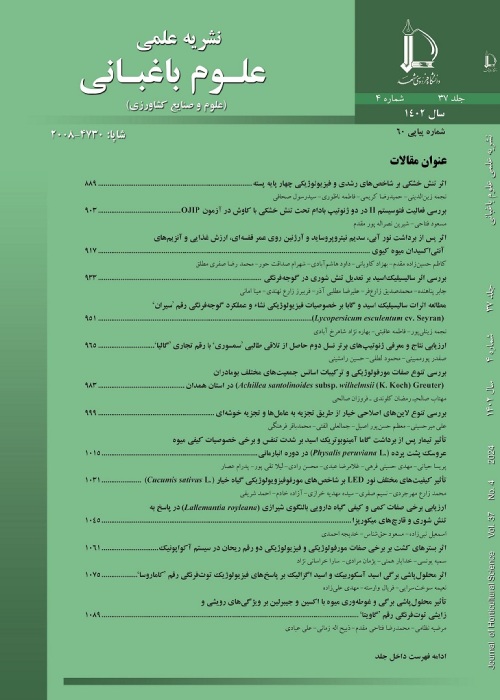The Effect of Alcoholic Extract of Propolis and Hydro Cooling on Some Postharvest Characteristics of Cucumis sativus
Cucumber is a vegetable with a low capacity for storage; it usually loses quality 14 days from the beginning of storage. The benefits of cold storage are not the same for all the fruit or vegetables, some given vegetables are more suitable for cold storage than others. However, pre-cooling is always advisable, because the products takes profit from the benefits of low temperatures in cold storage rooms. Due to the short shelf life of cucumber and the high speed of reducing its quality, various methods are used to maintain the quality of cucumber, such as edible coatings. Propolis, also called “bee-glue,” is a natural resinous substance produced by honeybees from plant exudates, beeswax, and bee secretions in order to defend the hives. Propolis has an important role in prevention of food loss weight and waste, thus helping to ensure food safety and security. The concoction of aqueous propolis extracts has a lower cost as compared to hydroalcoholic extracts and it is believable that both, aqueous and hydro alcoholic extracts, present similar concentrations of phenolic compounds resulting in a product of appropriate functional characteristics. Herein, the biochemical composition and efficacy of propolis in maintaining the postharvest storability of food products were discussed to provide a comprehensive guide to farmers and food processing and storage sectors and to scientists.
In order to investigate the effect of two factors of hydro cooling and propolis as an edible coating on cucumber shelf life, this study was conducted in the spring and summer of 2019 in the laboratories of horticultural sciences, Faculty of Agriculture, Ferdowsi University of Mashhad. The factorial experiment was based on a completely randomized design. Experimental treatments included three levels of propolis alcoholic extract (0, 4 and 8%) and two temperature treatments (4 (hydro cooling temperature) and 25 ° C) in 4 replications.Weight loss, tissue firmness, extract pH, total soluble solids, chlorophyll a, chlorophyll b, total chlorophyll, total phenol and antioxidant activity were measured. The experimental data were analyzed using Jump-8 statistical software and the means of treatments were compared by LSD test at 5% probability level.
Results showed that the interaction of treatments had an effect on fruit weight loss percentage, firmness, and antioxidant activity, chlorophyll and total soluble solids. Thus, the highest percentage of fruit weight loss was observed in the control treatment (without propolis) in 4°C (5.02%). Foliar application of fruits led to an increase in firmness of fruit tissue with propolis in both concentrations of 4 and 8% compared to the control treatment (no foliar application with propolis) in both temperature treatments. The highest total chlorophyll content was in 8% propolis treatments + temperature of 24 °C (8.96 mg / gfw), treatment of 8% propolis + temperature of 4 °C (8.68 mg/gfw) and treatment of 4% propolis + temperature of 4 oC (7.93 mg/gfw) significantly. In addition, antioxidant activity increased in the treatments of 4 °C+ foliar application with propolis 4 and 8%. In general, although fruits treated with 24 ° C showed more weight loss than 4 °C, the use of both concentrations of propolis improved the above trait, reducing the amount of fruit phenol and tissue firmness and other biochemical traits. Studies have shown that the chemical composition of the propolis samples which a certain breed of bees (Apis mellifera intermissa) made have 17 different chemical compounds. They noted that the main phenolic compound was caffeic acid (0.85 mg·g−1 EAP) and the main flavonol compound was pinocembrin (0.82 mg·g−1 EAP). Significant (P ≤ 0.05) differences were observed in dragon fruit quality when treated with different concentrations of ethanolic extract of propolis (EEP) (0.25, 0.50, 0.75 and 1.0%) and stored at 20 ± 2 °C and 80 ± 5% relative humidity (RH) for 20 days, which matched our results. Passos et al. (2016) reported test panel did not detect significant differences amongst coated and not coated cv. Prata bananas up to six days of storage. Propolis extracts.
In addition to a broad spectrum of antimicrobial activity, contain hydrophobic composites that assist in ameliorating attributes as biodegradable films on fruits.
- حق عضویت دریافتی صرف حمایت از نشریات عضو و نگهداری، تکمیل و توسعه مگیران میشود.
- پرداخت حق اشتراک و دانلود مقالات اجازه بازنشر آن در سایر رسانههای چاپی و دیجیتال را به کاربر نمیدهد.




